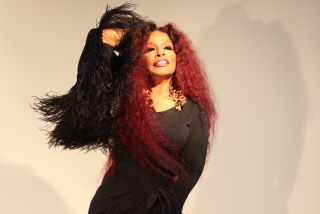The Girl Can’t Help it
- Share via
The wannabe models and goatee-boasting boys clogging the Hollywood disco Goldfingers sipped their Cosmopolitans and swayed contentedly to the music issuing from the stage. Yet the enthusiastic applause from the young and beautiful palms caressed neither an indie rocker nor deejay-of-the-moment but 81-year-old Hadda Brooks and her baby grand piano. The in-crowd, invited by Virgin Records and flashy Detour magazine, giggled when Brooks wandered into the audience to coo at various men, then went a little wide-eyed when she launched into a lascivious rendition of “Need a Little Sugar In My Bowl.”
Just as MTV fostered a resurgence for Tony Bennett, so have club dates thronged by L.A.’s youthful cognoscenti fueled a late-career revival for Brooks. More than 50 years after her first recordings, she has notched a residency at the Strip’s bastion of cool, the Viper Room, held court for five nights at New York’s Algonquin Hotel and, at the invitation of director Mike Figgis, performed at Uma Thurman’s birthday party.
Born Hadda Hopgood in 1916 in Boyle Heights to a sheriff father and doctor mother, she took up piano at age 4. Jukebox operator Jules Bihari changed her surname and made her instrumental “Swingin’ the Boogie” the first Modern Records release in 1945, prefiguring Modern albums by Etta James and B.B. King. After Brooks added vocals to her repertoire, she sang the torch ballad “I Hadn’t Anyone Till You” to Humphrey Bogart in 1950’s “In a Lonely Place,” and in 1951 became one of the first black women to have her own TV show. She traveled the world, played at Wimbledon stadium for Queen Elizabeth II and had a private audience with Pope Pius XII (“He was very thin”).
Brooks ditched L.A. (“The audiences were very rude”) and performed in Australia and Europe before retiring in 1971. Her appearance in Richard Lamparski’s 1987 book “Whatever Became of . . . “ sowed the seeds of her revival. Now she has a contract with Virgin Records--her album “I’ve Got News for You” is due out this summer--and admits to enjoying the surprised glances she gets when she sings songs such as “You Can’t Tell the Difference After Dark.”
“It’s like a second chance,” Brooks enthuses of the Viper Room and similar crowds. “And I’m very happy about it, because I am not going to be wheeled up to a piano to sing to people who are 60 and 80 years old.”
More to Read
The biggest entertainment stories
Get our big stories about Hollywood, film, television, music, arts, culture and more right in your inbox as soon as they publish.
You may occasionally receive promotional content from the Los Angeles Times.










